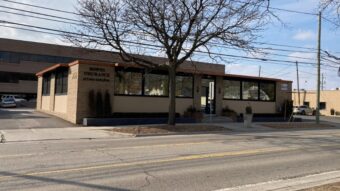Chicago’s commercial real estate professionals maintain optimism about the local real estate market, though perhaps with less fervor than in the recent past. Property, transfer and progressive taxes at the state and local levels, as well as other political uncertainties, have left some worrying about a coming bear market.
That’s the takeaway from The Real Estate Center at DePaul University’s second annual Chicago Mid-Year CRE Sentiment Report. Approximately 52 percent of participants characterize the market for the first half of 2019 as consistently strong—a number that fell from 69.8 percent in last year’s survey.
“In general, CRE professionals in Chicago want to be optimistic that there is plenty of strength and momentum left to keep the cycle moving forward,” said Charles Wurtzebach, Chair, Department of Real Estate and Douglas & Cynthia Crocker Endowed Director, the Real Estate Center, DePaul University. “Yet there are concerns and obstacles that can’t be overlooked.”
The respondents indicated general unease with the direction of the market. CRE professionals who reported bullish attitudes of the markets declined moderately from 31 to 29 percent, but there was a substantial increase, from 3.9 percent to 17.7 percent, in those feeling bearish.
Asset class breakdown
As in most parts of the country, industrial and multifamily properties continue to enjoy a robust environment; retail was the least attractive asset type, followed by suburban office properties. However, some in the industry believe that as industrial and downtown office property cap rates continue to compress, the risk-adjusted return of suburban office properties will invite renewed interest.
Though industrial continues to be the strongest asset class with almost 61 percent of participants ranking it as the most attractive, 26 percent had the opposite opinion, viewing it as the least attractive. This could indicate a perception that the sector has peaked, especially in submarkets where spec development of big-box warehouses has outpaced demand and absorption still lags.
Participants reported multifamily as the second most attractive asset class, followed closely by downtown office properties. This is in spite of the view that apartment sale pricing appears to be showing some signs of weakening. Supply and demand factors, at least in some pockets of the market, should maintain multifamily’s attractiveness.
Unsurprisingly, retail is the least attractive asset class. From a lending perspective, however, most capital sources still rank grocery and necessity urban infill retail as top investment categories. Big box and enclosed mall retail properties are seeing more conservative capital markets execution, though there has been some increased activity from buyers attracted to higher equity yields.
Chicago, Cook County and Illinois
Shane Garrison, chief operating and investment officer, RPAI, said that it is hard to allocate funds to the Chicago metro on a risk-adjusted basis and his firm is instead seeking new investment opportunities in markets like Dallas, Washington, D.C. and New York. RPAI’s plans for Illinois are limited to executing management and leasing plans for properties already in their portfolio.
“We think it’s important to invest in the underlying real estate—property whose metrics demonstrate the long-term potential to go vertical,” said Garrison.
The Chicago real estate market is either consistently strong or strengthening, according to 62 percent of respondents. Brian Rogan, vice president and senior private banker, Wells Fargo shares this view, citing increasing values, the abundance of available debt capital and good activity levels across virtually all property sectors.
“I think it is going to continue, barring any big, fundamental economic crisis,” Rogan said. “My long-term view remains positive for current owners and future developers.”
There are sound fundamentals now in place, but political and economic uncertainty in Chicago and Cook County did moderate some respondents’ outlook. Michael Newman, president and CEO, Golub & Company, said that some owners, like Golub, may opt to refinance rather than market properties for sale if issues such as the region’s tax environment remain ambiguous.
“Attitudes are generally positive, but they can get and do get tempered when various other factors specific to the city, the county or the state get factored in,” said Newman. “The property tax situation along with the changing dynamics of the city’s stance on development is creating uncertainty for owners and developers.”
The potential for a progressive income tax, an increasing property tax burden and the specter of rent control measures are enough, according to Garrison, to scare investors seeking long-term acquisitions away from the Chicago metro. “We’re unique in Illinois, and in Cook County, because of lingering financial issues,” he said. “It is a significant structural problem.”
The bull and the bear
At the mid-point of 2019, 45.1 percent of participants—nearly the same as last year—say they are neither bullish nor bearish but trending toward concerned. Yet the number trending toward optimistic also changed rather dramatically, down to 9.8 percent in 2019, from 21.2 percent in 2018.
Justin Hucek, occupier specialist, CBRE considers himself to be just right of center, leaning toward bullish. “Chicago is a great place to live relative to the coastal markets,” he said. “That will continue to drive growth and expansion as companies and investors want to have Chicago in the portfolios.”
“I think we are cautiously optimistic,” said Jennifer Rench, vice president, executive account manager, Chicago Title Insurance Company. “No one is negative or nervous about market indicators taking a dramatic turn. We’re simply being realistic about where we are in the cycle, and the opportunities ahead.”
Rench added that transactions have become more complicated and there are more pieces and/or partners to involve, making it take longer to get deals closed. Participants’ strong opinions on the market, mostly tax related, indicate that no matter where they place themselves on the bull/bear spectrum, there is a level of uncertainty that has already had an impact on the local market—regardless of what the future tax situation looks like.
Following the recent elections of a new Governor, Mayor, Cook County Assessor and a number of self-named socialist aldermen to the City Council, the region faces an unprecedented political climate. It’s too soon to properly gauge the effect that these new officials will have, but the hope is that they will remain generally friendly to business interests.
“Most everyone supports the new Assessor’s emphasis on transparency and hopes Lori Lightfoot will continue the momentum Mayor Emanuel established,” said Wurtzebach. “But there is widespread agreement that meaningful change takes time and can at times be painful.”



